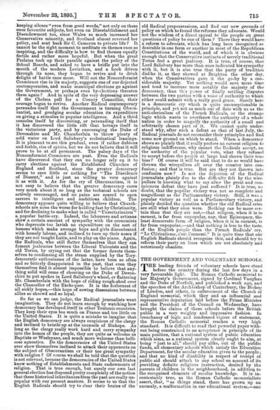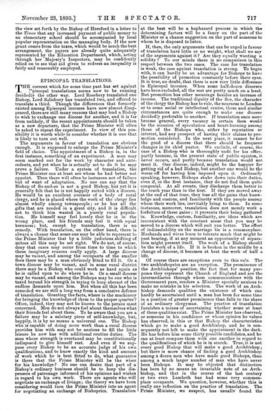THE GOVERNMENT AND VOLUNTARY SCHOOLS. T HE leading friends of voluntary
schools have stood before the country during the last few days in a very favourable light. The Roman Catholic memorial to her Majesty's Government, signed by Cardinal Vaughan and the Duke of Norfolk, and published a week ago, and the speeches of the Archbishop of Canterbury, the Bishop of London, and others, in enforcement of the Church of England memorial, which they and an influential and representative deputation laid before the Prime Minister and the President of the Council on Wednesday, have brought the claims of those schools before the British public in a very weighty and impressive fashion. In trenchancy of logic and condensed vigour of statement, the Roman Catholic memorial reaches a very high standard. It is difficult to read that powerful paper with- out being constrained to an acceptance in principle of its main position, that a national system of public education which aims, as a national system clearly ought to aim, at being "just to all," should pay alike, out of the public funds, all elementary schools which satisfy the Education Department, for the secular education given to the people ; and that no kind of disability in respect of receipt of public aid should attach to any school on account of its providing definite religious instruction, desired by the parents of children in the neighbourhood, in additio;tto the recognised elements of secular knowledge. It is in- contestably true, as the Roman Catholic memorialists assert, that, "as things stand, there has grown ,Up an anomaly, a malformation in our educational system,—one set of schools being wholly supported by public funds, and another set, doing precisely the same educational work, largely dependent upon alms," which are often raised with pain from among those ill able to afford them ; and that the inevitable and actual result of this " use of two scales of payment for the same public service" is that the partially eleemosynary schools are often starved, their teachers underpaid, their pupil-teachers overworked, and their apparatus inferior as compared with the Board-schools, which draw without limit on the public purse. The facts are so ; and even so, the case is understated. For not only is the voluntary agency exposed to the unrestrained com- petition of the rate-supported agency in regard to the manufacture of a standing tale of bricks ; but Pharaoh, in the shape of the Education Department, is for ever adding to the tale of bricks demanded, without making any additional contribution towards the straw required for their production. The Bishop of London, who en- forced this latter point strongly in his speech on Wednes- day, is one of our most truly liberal, as well as most experienced, educationists ; and we have difficulty in understanding how any fair-minded and intelligent person can fail to recognise that in its present working our primary school system is essentially defective from the point of view of permanent efficiency, not less than from that of equity. That being the case, it is not easy, if indeed it is possible, to escape the conclusion that logically the demand of the Roman Catholic memorialists stands justified,—the de- mand, that is to say, that the whole cost of the main- tenance of all elementary schools which satisfy the requirements of the Education Department should be met out of public resources. It ought, indeed, to be wide clear that the religious bodies which have founded, and which maintain the fabrics of, voluntary schools, will defray whatever part of their cost can be rightly charged to religious instruction, and though we can hardly sup- pose that the Roman Catholics would seriously contest this, the point is left in some doubt in their memorial. But, subject to this proviso, their full demand rests upon reasoning which, from the points of view of logic and strict justice, and of ideal efficiency too, it is hard to refute.
But, unfortunately, considerations of logic, of strict justice, and of ideal efficiency have too often in this im- perfect world to be subordinated to considerations of the Practical and the possible. A recognition of this truth animated the members of the Committee who, all but unani- mously, for there was but one exception, passed the memorial which the Archbishop of Canterbury and the deputation led by him presented to the head of the Government on Wednes- day, and was also clearly present in the Primate's excellent speech. In its statement of principles the Anglican memorial does not perhaps fall far short in substance of the Roman Catholic memorial. But in the character of the measures recommended, the former is distinctly more related to the actual cotditions of the problem before the Government than the latter can be said to be. The Prelates and other representative educationists of the Church of England do not ask that the State should undertake the whole charges of maintenance of voluntary schools, while leaving them in the hands of their founders and friends. They do not ask that the friends of those schools should be relieved of any of the burden of subscriptions for their support which they now bear. The voluntary subscriptions raised for Church-schools--and this is im- portant, as a remark of the Duke of Devonshire's on the point may lend itself to misconstruction—were larger by some £4,000 last year, when they reached £622,034, than in 1893, and they have risen steadily since 1889, when they stood at about £582,000; and this, by the way, is in addition to large sums, amounting in a short period to three-quarters of a million sterling, raised to meet recent demands of the Education Department in regard to the structural improvement of schools. Churchmen are ready to continue making the sacrifices, in the way of annual subscriptions, which they now make. But they ask first that the unreasonable handicap placed on poor schools by the "17s. 6d. limit" with regard to grants shall be removed, and that the absurdity of subjecting their school-buildings to local rates shall be abolished. The Duke of Devonshire's reply yesterday made it clear that these grievances will be removed. Their pressure, however, is only partial, and the relief afforded by their removal will be similarly limited. The Anglican memorial goes on to make other requests, of which the following is the chief :—" An increase of contributions from public sources sufficient to meet the general increased cost of education throughout the country, to be administered in such a manner as will prevent what is harmful in the competition between voluntary and Board schools." The italics are ours, and call attention to the important difference between the Anglican demand and that em- bodied in the Roman Catholic memorial. Both sets of memorialists are now practically at one in giving the pre- ference to the Treasury over the rates, as the source whence the additional aid required for voluntary schools should be drawn.
The replies given to the Anglican deputation on Wed- nesday by Lord Salisbury and the Duke of Devonshire, are all that could have been expected by any one whose disposition was not excessively sanguine. The Prime Minister's sympathy with the feelings and the aims of the deputation was expressed with the most unmistakable earnestness, and in his concluding sentence he assured his hearers that the efforts of Ministers, confident of the support of the Unionist party in such an endeavour, would be directed to securing "the best and most efficient means which the circumstances of the time allow, in order to remedy" the grievances which had been laid before him. The Chancellor of the Exchequer is the lion in the path, but he is a very well-disposed lion, and will not block the way, unless, or so far as, he is coerced into doing so by the clearest call of duty and even necessity. The Duke of Devonshire, having made the concessions already mentioned, treated the deputation to some depart- mental criticism of their proposals which was by no means without force, but which, we are inclined to think, might be not ineffectively met. He assumed that what they desired was an additional grant to all elementary schools, the statutory equality of treatment of voluntary and Board schools by the Education Department being supposed to be unassailable ; and on that he pointed out that an equal increase of grant all round might lead to waste of public money in Board-schools, might not check the competition between the two classes of schools, and might even lead to a falling-off in subscriptions. There is much plausibility in these suggestions, but everything would depend on the mode in which the new grant was administered. It has been suggested that a moderate additional grant per head might be made, subject to the condition that it could not be claimed if the average expenditure exceeded a certain maximum or fell below a certain minimum, which limits would be fixed by the Department, in view of the circumstances and recent practice of the district concerned. The result of such a condition would be that on the one hand there would be a discouragement to School Board extravagance, and on the other hand any tendency to a fall in subscriptions to voluntary schools, in consequence of the new grant, would be prevented. By some such arrangement as this, we are inclined to think, real relief would be given to voluntary schools and to poor Board-schools, of which there are a good many, while no check would be placed except upon the really unwholesome and injurious element in the com- petition between the two classes of schools.
There may be other plans by which the same results could be equally well or better secured. The thing to be aimed at is the working of the dual system of primary schools, set up by the Act of 1870, with fairness all round, so that the friends of neither branch of that system should possess any undue advantage over the friends of the other. That is the aim which dominated the admirable speech of the Primate on Wednesday, and which conspicuously inspires the Anglican memorial. That is the aim inspiring the request for a revision of School Board precepts by some public authority; and for the pro- vision of " all reasonable facilities for the separate religious instruction of children in Board or voluntary schools whose parents may desire it, in the spirit of the Industrial Schools Act of 1866." The carrying-out of this latter suggestion would involve as much sacrifice on the part of the managers of Church schools in the country, as on the part of the managers of Board-schools in towns,—and more. In view of this fact, the ravings of Radical journalists, streaked with allusions to Macbeth and Judas on the subject of the "betrayal" to which Ministers are obviously inclining, are seen to be not less at variance with the proprieties of political discussion than unworthy of rational beings. We cannot see any justification for the view set forth by the Bishop of Hereford in a letter to the Times that any increased payment of public money to an elementary school should be accompanied by local popular representation on the managing body. If the new grant comes from the taxes, which would be much the best arrangement, the payers are already quite adequately represented by the Education Department, which, acting through her Majesty's Inspectors, may be confidently relied on to see that aid given to redress an inequality is fairly and reasonably employed.












































 Previous page
Previous page